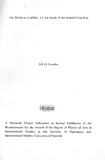| dc.contributor.author | Gumba, D E O | |
| dc.date.accessioned | 2012-11-13T12:29:12Z | |
| dc.date.available | 2012-11-13T12:29:12Z | |
| dc.date.issued | 2011 | |
| dc.identifier.uri | http://erepository.uonbi.ac.ke:8080/handle/123456789/3486 | |
| dc.description.abstract | This study set out to trace the development of the media against the backdrop of the origin and evolution of the Somali conflict, assess the extent of media involvement in the Somali conflict and the impact of the media on the course and outcome of the conflict. The study attempted to answer the question: Is the media an important supplementary actor in a conflict and more specifically in attempts to end it?
The study focused attention on the dimension of the role the media played in escalating the Somali conflict during the rise and fall of the Union of Islamic Courts and what role the media can play in the current efforts to resolve the conflict. The study sought to assess possible expressions of war journalism versus expressions of peace journalism using the tools of conflict analysis.
The study employed the peace-war journalism framework of analysis and found that both the local and international media propagate 'war journalism' than 'peace journalism'. In addition, propaganda-orientation in media coverage prevails over factual orientation. However, the findings show that international media lead in propagating violence-orientated
reports. | en_US |
| dc.language.iso | en_US | en_US |
| dc.publisher | University of Nairobi, Kenya | en_US |
| dc.title | The media in conflict: a case study of the Somali Civil War | en_US |
| dc.title.alternative | Thesis (MA) | en_US |
| dc.type | Thesis | en_US |

